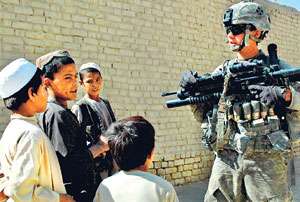UNITED NATIONS, (AFP) - Among all the UN accords, protocols and mechanisms that seek to defend the estimated 13.5 million children lost in conflict around the world, none mentions the right to feel a parent's love.
And that is just what Joseph and Alima said they had missed when they appeared before a very official UN panel on children displaced by wars.
Joseph is one of the army of "Lost Boys" of Sudan. After escaping a burning hut he became separated from his mother, carried a gun before he was 10, saw many people killed, ate bats and rats to survive.
Alima was growing up in the Taliban's hardline Afghanistan of the 1990s when her family decided it could take no more and ended up penniless in a refugee camp in Pakistan.
"We had very different experiences but we grew up with the same fears and traumas," Alima, now 21, told AFP in an interview after her appearance at the United Nations headquarters.
Neither gave their family name when they told their terrible stories to a UN panel on children in war, held to back a UN campaign to enforce new guidelines.
 |
| US soldier on patrol speaks with Afghan children in the Mahalajat area on the edge of Kandahar city.AFP |
Joseph, now 32, was seven when Sudanese government soldiers tied him and his mother up in a burning hut. "We were to be burned alive. I don't know what happened, maybe God intervened, but there was a storm. The rain came down, the soldiers fled, and somehow my mother got us out," he said.
The two became separated though and only made contact again in 2005, and they have still not met again.
From the age of seven to 10, he lived with the then-rebel Sudan People's Liberation Army (SPLA) soldiers. "They were like my parents. Wherever they went I would go. If they went fighting, I would fight in the war zone.""I saw so many innocent people killed."He met his father, an SPLA soldier, but in 1990 they also became separated and Joseph joined about 30,000 orphaned children sent to camps on Sudan's borders in an odyssey that has since been made into books and movies.
"We survived by eating rats and bats," he recalled.
Joseph was resettled to the United States in 2001 and four years later was miraculously put in touch with his mother and two sisters in Khartoum. "The last time I saw my mother was 25 years ago, but she is alive. I talk to her on the telephone, she tells me what is happening.
"I don't know whether I will see my mother, maybe she will die," he said. Joseph now studies criminal justice in Washington, DC. His father is still in the south Sudan military. The looming self-determination referendum in the country worries him.
-- 'I was never a child' --
He says it is too dangerous to return and he cannot afford to bring his whole family out. "I feel like I was never a child, that I was always an adult. I feel like I have lost my whole life. To have never had my mother next to me is a horrible feeling, like I was never born," he said.
Children in war, he said, are "treated like animals. Many of them don't even know their birthday, many of them die like animals, with no voice."Afghanistan's troubles forced Alima and her parents and seven brothers and sisters to move from the northern city of Mazar-i-Sharif, first to the capital Kabul and then to join the millions in refugee camps in Pakistan and Iran before they were resettled to the United States.
Now a pharmacy student at the University of Washington in Seattle, Alima said the Taliban still give her nightmares.
"They don't think women and men are equal. They mistreat women, they rape women. I have seen how." She was with one of her mother's best friends in a Kabul market when the woman was beaten for not covering her feet.
"I remember them, I remember what they looked like, I remember how they talked, I remember what they did. I have tried hard to erase them from my memory but it is really hard. It holds me back in life. "I have friends whose father and brothers were murdered in front of them. There are families whose stories are a lot worse than mine," she said.
"It is something that is haunting me and I can't just let it go. So I want to speak out about it and help out and then one day I will feel that I actually did help and then maybe those haunting memories will let go."Alima said she wanted to speak for the "millions out there who are still in that torment, as me and Joseph.
"They have no family and they have no voice. Nobody to love and don't feel love back. We need to help them. "In southern Sudan, boys and girls are still only gradually being released from camps. In Somalia, Burundi, Nepal and other countries there are countless children displaced and without parents.
Radhika Coomaraswamy, the UN special representative for children and armed conflict, said "they are like aliens in their own country" and that governments must take care of children who become lost in wars.
Too many want the United Nations to take responsibility. "That should not be," she said. "The mark of sovereignty is that you will protect your civilians and your citizens." |


